八年级上英语词性转换整理教案资料
人教版八年级英语上册第八单元词形转换

第一部分:词性转换的概念和基本规则1. 词性转换的概念词性转换是指根据上下文的需要,将一个词从它原来的词性转换成另一个词性的过程。
在英语中,词性转换通常涉及名词、动词、形容词和副词之间的转换。
2. 基本规则(1)名词与动词之间的转换一般情况下,名词可以转换为动词,动词也可以转换为名词。
例如:dance(n.舞蹈)→dance(v.跳舞);work(n.工作)→work (v.工作)。
(2)形容词与副词之间的转换形容词可以转换为副词,副词也可以转换为形容词。
例如:happy(adj.快乐)→happily(adv.快乐地);slow(adv.慢地)→slow(adj.慢的)。
第二部分:名词与动词的转换1. 名词转换为动词有些名词可以转换为动词,这通常通过在名词前加上适当的动词形式来实现。
例如:friend(n.朋友)→befriend(v.与...交朋友);peace(n.和平)→peace(v.使...安静)。
2. 动词转换为名词动词转换为名词通常通过在动词前加上适当的后缀来实现。
例如:climb(v.攀登)→climb(n.攀登);teach(v.教)→teach (n.教学)。
第三部分:形容词与副词的转换1. 形容词转换为副词形容词转换为副词通常通过在形容词后加上-ly来实现。
例如:quick(adj.快的)→quickly(adv.快速地);happy(adj.快乐的)→happily(adv.快乐地)。
2. 副词转换为形容词副词转换为形容词通常通过去掉副词后缀-ly来实现。
例如:slowly(adv.慢地)→slow(adj.慢的);carefully(adv.小心地)→careful(adj.小心的)。
第四部分:词性转换的练习题1. 单词转换请根据下列单词的词性和含义进行适当的转换。
1)hope(n.希望)→hope(v.希望)2)lucky(adj.幸运的)→luckily(adv.幸运地)2. 句子改写请根据下列句子的要求进行适当的词性转换。
初中语法 词性教案

初中语法词性教案教学目标:1. 学生能够理解英语中的十大词性,包括名词、动词、形容词、副词、代词、数词、冠词、介词、连词和叹词。
2. 学生能够识别并运用这些词性在句子中正确表达意思。
3. 学生能够通过练习,掌握不同词性的用法和特点。
教学重点:1. 掌握英语中的十大词性。
2. 能够正确运用这些词性构造句子。
教学难点:1. 不同词性的用法和特点。
2. 词性转换的规则。
教学准备:1. PPT课件。
2. 练习题。
教学过程:一、导入(5分钟)1. 引导学生复习已学的英语基础知识,如单词、句子等。
2. 提问:同学们,你们知道英语中单词的分类吗?今天我们将学习英语单词的分类,也就是词性。
二、新课讲解(15分钟)1. 讲解十大词性的概念和特点:a) 名词:表示人、事物、地点、抽象概念等。
b) 动词:表示动作、状态、存在、变化等。
c) 形容词:表示事物的特征、性质、状态等。
d) 副词:表示程度、方式、时间、地点等。
e) 代词:代替名词或名词短语。
f) 数词:表示数量、顺序、时间等。
g) 冠词:用于修饰名词,表示泛指或特指。
h) 介词:表示时间、地点、方向、关系等。
i) 连词:连接单词、短语或句子。
j) 叹词:表示感叹、惊喜、疑问等。
2. 通过例词和句子,展示不同词性的用法。
三、课堂练习(15分钟)1. 学生分组,进行词性辨别练习。
2. 学生互相检查,纠正错误。
四、总结与拓展(5分钟)1. 教师引导学生总结词性的特点和用法。
2. 提问:同学们,你们还能想到哪些词性转换的规则吗?五、课后作业(课后自主完成)1. 学生根据所学内容,完成练习题。
2. 家长签字确认。
教学反思:本节课通过讲解、练习、互动等形式,使学生掌握了英语中的十大词性。
在教学过程中,注意引导学生通过实例去理解不同词性的用法,提高学生的实际运用能力。
同时,通过课后作业的设置,使学生能够巩固所学内容,提高学生的自主学习能力。
在今后的教学中,继续加强对词性转换规则的讲解和练习,使学生能够更加熟练地运用不同词性。
英语词性串讲教案模板范文

课时:2课时年级:八年级教材:《英语》人教版八年级上册教学目标:1. 知识目标:让学生掌握英语中的主要词性,包括名词、动词、形容词、副词、介词、连词和代词,并能正确运用。
2. 能力目标:培养学生分析句子成分的能力,提高学生的英语语法运用能力。
3. 情感目标:激发学生对英语语法的兴趣,增强学习英语的自信心。
教学重难点:1. 重点:掌握英语词性的基本概念和用法。
2. 难点:能够灵活运用不同词性进行句子成分分析。
教学准备:1. 教师准备:PPT课件、单词卡片、例句卡片、练习题。
2. 学生准备:提前预习英语词性,准备相关例句。
教学过程:第一课时一、导入1. 教师通过提问引导学生回顾已学过的英语语法知识。
2. 学生分享自己对英语词性的理解。
二、新课讲授1. 教师介绍英语中的主要词性:名词、动词、形容词、副词、介词、连词和代词。
2. 通过PPT展示每个词性的定义、用法和例句。
3. 分组讨论,让学生结合例句分析词性。
三、巩固练习1. 教师出示例句,让学生判断词性。
2. 学生上台展示自己的判断结果,教师点评。
四、课堂小结1. 教师总结本节课所学内容,强调词性在句子中的作用。
2. 学生分享学习心得。
第二课时一、复习1. 教师提问,检查学生对上一节课所学内容的掌握情况。
2. 学生分享自己的学习体会。
二、拓展练习1. 教师出示句子,让学生找出其中的词性。
2. 学生上台展示自己的分析结果,教师点评。
三、小组活动1. 学生分组,每组选择一个词性,进行相关例句的收集和整理。
2. 各组汇报自己的成果,其他组进行评价。
四、课堂小结1. 教师总结本节课所学内容,强调词性在句子中的作用。
2. 学生分享学习心得。
教学评价:1. 课堂参与度:观察学生在课堂上的发言、提问和练习情况。
2. 知识掌握情况:通过课堂提问和课后作业检查学生对英语词性的掌握程度。
3. 能力提升情况:通过学生的实际运用情况评价其英语语法运用能力。
课后作业:1. 复习本节课所学内容,整理笔记。
牛津沪教版英语八年级上册 词性转换复习学案

八年级上词转转换复习一. 复习思路对8A 1-7单元考查的词性转换做专项复习,归纳总结,讲练结合。
二、复习要点(上课过程中例题上方的知识点去掉,先练习再归纳)【U1词性转换】1. high (adj.) 高的— height (n.) 身高weigh (v.) 称重— weight (n.) 体重例题:Please tell me about your _______________ (high) and _______________ (weigh).Do you know how to _______________ (weight) an elephant?2. account (n./v.) 账目/记账— accountant (n.) 会计师例题:Jane is good at Maths, so she will be an _______________ (account) in the future.3. sign (v.) 签字— signature (n.) 签名例题:There is a _______________ (sign) at the end of a letter.Don’t forget to _______________ (signature) your name.4. engine (n.) 引擎— engineer (n.) 工程师例题:His father is an _______________(engine).5. close (v.) 关闭— enclose (v.) 随函附上例题:I _______________ (close) a photo of myself and some of my friends.6. friend (n.) 朋友— friendly (adj.) 友好的例题:The old lady is always _______________ (friend) to her neighbours.7. ambition (n.) 志向— ambitious (adj.) 有志向的例题:Ken is a model student and he studies hard for his _______________ (ambitious).8. own (v.) 拥有— owner (n.) 拥有者,主人例题:The rich man _______________ (owner) a house and he is the _______________ (own) of it.9. probable (adj.) 可能的— probably (adv.) 可能地例题:Kitty will _______________ (probable) be a good singer in 15 years’ t ime.10. Germany (n.) 德国— German (n./adj.) 德语,德国人/德国的— Germans (pl.)例题:I am a girl from _______________ (German). She is a _______________ (Germany) girl.11. good (adj.) 好的— well (adv.) 很好地— better (adj./adv.)更好的/地— best (adj./adv.)最好的/地例题:Ann is a top student so she does _______________ (good) in most subjects.His English is the _______________ of all the subjects. (better)12. bad (adj.) 坏的— badly (adv.) 坏地— worse (adj./adv.) 更坏的/地— worst (adj./adv.) 最坏的/地例题:Among all the subjects, Chinese is my _______________(bad) subject.13. physics (n.) 物理学— physical (adj.) 物理的,身体的例题:_______________ (physical) is my favourite subject.14. I (pron.主格) — myself (pron.反身代词)例题:I will tell you something about _______________(I).15. act (v.) 行动— actor (n.) 男演员— actress (n.) 女演员例题:Jackie Chan is a famous _______________ (act) in Asia.Gong Li is one of the most famous _______________ (act) in China.16. happy (adj.) 开心的— happiness (n.) 幸福例题:Money doesn’t always bring _______________ (happy).17. foot — feet (pl.)例题:This pair of shoes doesn’t fit his _______________ (foot).18. glass — glasses (pl.)例题:She always goes out with a pair of _______________ (glass)19. tooth — teeth (pl.)例题:We must brush our _______________ (tooth) every day.20. ski (v.)滑雪— skiing (n.)例题:The Blacks always go _______________ (ski) during the winter holidays.【U2词性转换】1. succeed (v.) 成功— success (n.) 成功— successful (adj.) 成功的— successfully (adv.) 成功地例题:The sports meeting in our school was very _______________ (success).If you work hard, you can get great _______________ (successful).Finally, I tried my best to fix the machines _______________ (successful).2. busy (adj.) 忙碌的— business (n.) 生意,商业— businessman (n.) 商人例题:Mr. Wood always discusses the _______________ (busy) over lunch and dinner every day.3. assist (v.) 帮助— assistant (n.) 助手例题:Miss Wu is the best shop _______________ (assist) in the shopping centre.4. sell (v.) 卖— sale (n.) 销售— seller (n.) 销售者例题:Everything will be on _______________ (sell) at Christmas in Hongkong.My mother is responsible for _______________ (sell) in her factory.5. day (n.) 一天— daily (adj.) 每天的例题:What do you think of your _______________ (day) life?6. discuss (v.) 讨论— discussion (n.) 讨论例题:Everything is ready. Let's have a _______________ (discuss) about the outgoing.7. bore (v.) 使厌烦— bored (adj.) 感到厌烦的— boring (adj.) 令人厌烦的例题:What a _______________ (bore) lesson it is!He gets _______________ (bore) with his work.8. manage (v.) 管理— manager (n.) 经理例题:Simon is the _______________ (manage) of his company.9. luck (n.)运气— lucky (adj.)幸运的— luckily (adv.)幸运地— unlucky (adj.)不幸的例题:_______________ (luck), he caught the early bus yesterday morning._______________ (luck), he fell off the bike and broke his leg.10. fail (v.) 失败— failure (n.) 失败例题:I _______________ (failure) in the English test last term, I was unhappy.11. drive (v.) 驾驶— driver (n.) 司机例题:The bus_______________ (drive) asked the passengers to buy tickets one by one.12. usual (adj.) 通常的— unusual (adj.) 不寻常的— usually (adv.) 通常地例题:I _______________ have a class meeting once a week. (usual)To my surprise, he came home later than _______________ (usually).13. bake (v.) 烘烤— baker (n.) 面包师— bakery (n.) 面包房例题:Mrs. Black owns a _______________ (bake) on Nanjing Road.14. different (adj.) 不同的— difference (n.) 不同之处例题:The strawberries from Australia are _______________ (difference) ones from Japan.15. interest (n.) 兴趣— interested (adj.) 感到有趣的— interesting (adj.) 令人有趣的例题:I want to be a poet, because I’m _______________ (interest) in writing poems.Are there any _______________ (interest) news in the paper this morning?16. France (n.) 法国— French (n./adj.) 法语/法国的— Frenchman (n.) 法国人例题:Harry was born in Germany, but he can speak _______________ (France) very well.17. hot (adj.) 热的— heat (n.)热例题:Everything on the Earth gets _______________ (hot) from the sun.18. health (n.)健康— healthy (adj.) 健康的例题:Milk and vegetables are _______________ (health) food.I do exercises regularly, so I’m _______________ than before. (health)19. explain (v.)解释— explanation (n.)解释例题:I have known the truth. You needn’t _______________ (explanation) any more.20. two (n./adj.)二— twice (adv.) 两次例题:My grandparents go to park _______________ (two) a week.21. responsible (adj.)负责的— responsibility (n.)责任例题:Our class teacher is _______________ (responsibility) for our class.22. perform (v.)表演— performance (n.)演出— performer (n.)演员例题:Luckily, David _______________ (performance)well in the contest.He is the best _______________ (perform) in the play.23. jog (v.)慢跑— jogging (n.)例题:_______________ is a good activity for old people. (jog)24. begin (v.)开始— beginning (n.)例题:At the _______________ (begin) of the meeting, all the people stand up to sing a song.【U3词性转换】1. rob (v.) 抢劫— robber (n.)强盗— robbery (n.) 抢劫案例题:I saw a _______________ (rob) in the bank yesterday.The twins acted as two _______________ (rob) in the play.The man _______________ (robber) the woman’s purse.2. quiet (adj.) 安静的— quietly (adv.) 安静地例题:Look! Those children are sitting there _______________ (quiet).Children, keep _______________ (quietly).3. tour (v.) 参观— tourist (n.) 参观者例题:I saw two _______________ (tour) visit his home last night.We want to _______________ (tourist) the Great Wall in the holiday.4. worry (v.) 担心— worried (adj.) 担忧的— worriedly 担忧地(adv.)例题:Why was that man look _______________ (worry)?The woman looked _______________ (worry) at her sick son.5. thief (n.)小偷— theft (n.)偷窃案例题:Yesterday a woman reported a _______________ (thief) to the policemen.The police caught three _______________ (thief) last Sunday.6. sudden (adj.) 突然的— suddenly (adv.) 突然地例题:Then _______________ (sudden) Mrs Brown noticed that her purse was not in her handbag.I’m sorry to hear the _______________ (suddenly) death of his grandmother.7. argue (v.) 争论— argument (n.) 争论例题:Just now Li Hui and his brother got into a big _______________ (argue).Because of generation gap, the children often _______________ (argument) with their parents.8. usual (adj.)通常的— usually (adv.) 通常地— unusual (adj.) 不寻常的例题:It is _______________ (usual) for Ben to be late for school. He always goes to school early.I _______________ (unusual) read books with my parents.9. crowd (n.) 人群— crowded (adj.) 拥挤的例题:That road is always _______________ (crowd) with traffic.There is a big _______________ (crowded) over there. What’s happening?10. care (n.) 小心— careful (adj.) 小心的— carefully (adv.) 小心地例题:Please look _______________ (care) at the blackboard, children.Be _______________ (care) when you do your homework.11. danger (n.) 危险— dangerous (adj.) 危险的例题:It’s very _______________ (danger) to go out alone at night in this city.We should offer those who are in _______________ (dangerous).12. do (v.) 做— done (adj.) 完毕了的例题:“Well _______________ (do).” My teacher said.13. true (adj.) 真的— truly (adv.) 真地— truth (n.) 事实例题:Why didn’t you tell me the _______________ (true) yesterday?14. quick (adj.) 快的— quickly (adv.) 快地例题:Her friend moved through the crowd _______________ (quick).It’s much _______________ to go to Pudong International Airport by maglev than by bus. (quickly) 15. cross (v.) 穿过— across (prep.) 穿过例题:While the bus was passing _______________ (cross) the road, the driver saw a boy standing in front.16. hurry (v.) 匆忙— hurried (adj.) 匆忙的— hurriedly (adv.) 匆忙地例题:The man went aboard _______________ (hurry).The postman went aboard in a _______________ (hurried).17. tell (v.) 告诉— teller (n.) 出纳员,叙述者例题:Please give the money to the _______________ (tell).18. fun (n.) 乐趣— funny (adj.) 有趣的例题:The stories in this book sound _______________ (fun).What great _______________ (funny) it is!19. follow (v.) 跟随— following (adj.) 下列的例题:Could you answer the _______________ (follow) questions in English?20. woman — women (pl.) man — men (pl.)例题:There are two _______________ (woman) tourists.Two-thirds of doctors are _______________ (man) doctors.21. please (v.) 使高兴— pleased (adj.) 感到高兴的— pleasant (adj.) 令人高兴的例题:They had a _______________ (please) trip last summer.I was _______________ (please) to meet you here.22. wait (v.) 等待— waiter (n.) 男服务生— waitress (n.) 女服务生例题:His sister works as a _______________ (wait) in a restaurant.23. strange (adj.) 奇怪的— stranger (n.) 陌生人例题:Children shouldn’t talk to a _______________ (strange) when they are at home alone.【U4词性转换】1. invent (v.) 发明— invention (n.) 发明物— inventor (n.) 发明家例题:The first steam engine by James Watt was one of the greatest _______________ (invent) in the world.The electric light is a great _______________ (inventor) by Thomas Edison.Who _______________ (invention) the 1 to 9 system of numbers?2. amaze (v.) 使惊奇— amazed(adj.) 感到惊奇的— amazing (adj.) 令人惊奇的例题:We find some _______________ (amaze) stories in this book.He was _______________ (amaze) to hear the news.3. calculate (v.) 计算— calculation (n.) 计算— calculating (adj.) 计算的— calculator (n.) 计算器例题:Let me _______________ (calculation) the cost of the journey.With the help of a computer , we can do _______________ (calculate) much faster.A computer is the _______________ (calculator) machine.We use _______________ (calculating) to calculate.4. electron (n.) 电子— electronic (adj.) 电子的例题:Students are not allowed to use _______________ (electron) calculators in class.5. live (v.) 生活— living (adj.) 活的— alive (adj.) 活着的例题:Scientists from all around the world want to know why all _______________ (live) things died at the end of the Cretaceous period(白垩纪).You are lucky to be _______________ (live) after the accident.6. instruct (v.) 指示— instruction (n.) 指示例题:Before the computer could begin calculating , someone had to program it with ____________ (instruct).7. develop (v.) 发展— developing (adj.)发展中的— developed(adj.)发达的— development (n.) 发展例题:With the _______________ (develop) of economy , China is becoming stronger and stronger.China is a _______________ (develop) country and USA is a _______________ (develop) country.8. India (n.) 印度— Indian (n./adj.) 印度人,印度语/印度的例题:I have a new penfriend who is an _______________ (India) girl.9. near (adv.) 接近— nearly (adv.) 差不多例题:Although my grandfather is _______________ (near) 90 years old , he is still quiet healthy.10. power (n.) 力— powerful (adj.) 强大的例题:The sports car has a very _______________ (power) engine.Knowledge is _______________ (powerful).11. little (adj.) 小的— less (adj.) 更少— least (adj.) 最少的例题:At _______________ (little), I tried my best to help the lady.12. easy (adj.) — easier (adj. 比较级)例题:The invention of zero makes it _______________ (easy) to write big numbers.13. Greece (n.) 希腊— Greek (n./adj.) 希腊人,希腊语/ 希腊的例题:In ancient times, people in _______________ (Greek) were good at planting crops.14. nation (n.) 国家— national (adj.) 国内的— international (adj.) 国际的例题:As we all know, Tokyo is an _______________ (nation) city。
英语词性的转换初中教案
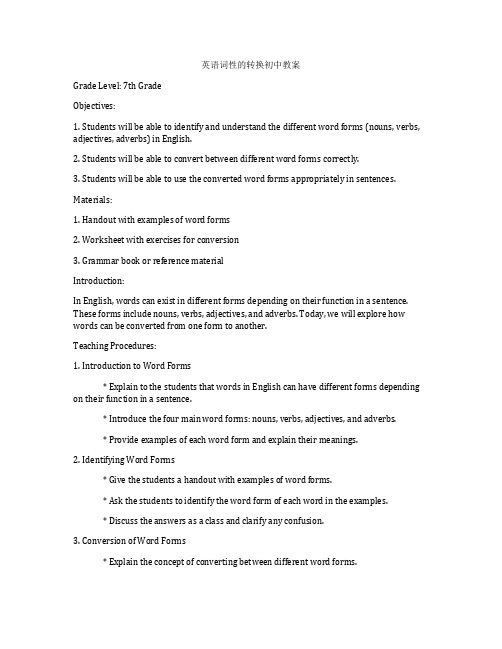
英语词性的转换初中教案Grade Level: 7th GradeObjectives:1. Students will be able to identify and understand the different word forms (nouns, verbs, adjectives, adverbs) in English.2. Students will be able to convert between different word forms correctly.3. Students will be able to use the converted word forms appropriately in sentences. Materials:1. Handout with examples of word forms2. Worksheet with exercises for conversion3. Grammar book or reference materialIntroduction:In English, words can exist in different forms depending on their function in a sentence. These forms include nouns, verbs, adjectives, and adverbs. Today, we will explore how words can be converted from one form to another.Teaching Procedures:1. Introduction to Word Forms* Explain to the students that words in English can have different forms depending on their function in a sentence.* Introduce the four main word forms: nouns, verbs, adjectives, and adverbs.* Provide examples of each word form and explain their meanings.2. Identifying Word Forms* Give the students a handout with examples of word forms.* Ask the students to identify the word form of each word in the examples.* Discuss the answers as a class and clarify any confusion.3. Conversion of Word Forms* Explain the concept of converting between different word forms.* Provide examples of how nouns can be converted to verbs, adjectives, and adverbs, and vice versa.* Discuss the rules and patterns for converting between word forms.4. Practice Exercises* Hand out a worksheet with exercises for converting word forms.* Instruct the students to complete the exercises, converting the given words from one form to another.* Provide assistance and clarification as needed.5. Sentence Practice* Ask the students to use the converted word forms appropriately in sentences.* Provide examples and models for sentence structure and usage.* Encourage the students to create original sentences using the converted word forms.6. Conclusion* Review the main concepts of the lesson with the students.* Emphasize the importance of understanding and using different word forms correctly in writing and speaking.* Encourage the students to practice and review the material outside of class. Assessment:1. Exit Ticket: Ask the students to create a sentence using three different word forms (noun, verb, adjective) and write it on an exit ticket.2. Homework: Assign a worksheet or writing assignment that requires the students to convert word forms and use them in sentences.3. Class Discussion: Observe the students' participation and understanding during the lesson.Extensions:1. Advanced Word Forms: Introduce additional word forms such as adverbs of time, place, and manner, and have the students practice converting between these forms as well.2. Writing Activity: Have the students write a short story or paragraph using a variety of word forms and correct sentence structure.Note: This lesson plan can be adjusted to fit the specific needs and abilities of the students.。
初中英语词性转换常见词汇教案资料
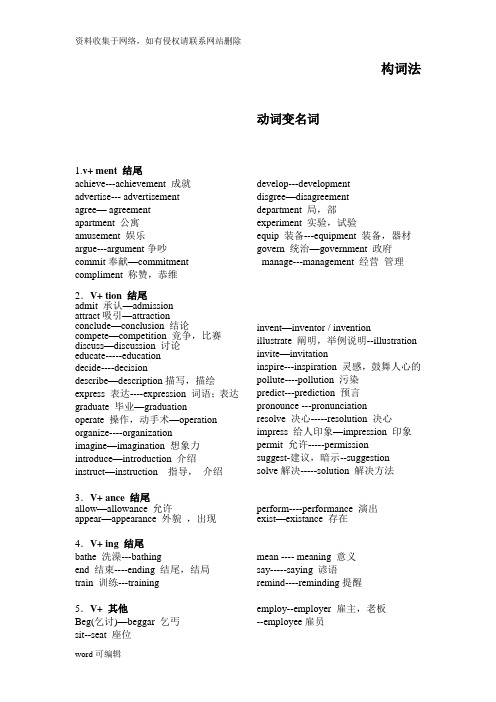
构词法动词变名词1.v+ ment 结尾achieve---achievement 成就advertise--- advertisement agree— agreement apartment 公寓amusement 娱乐argue---argument争吵commit奉献—commitment compliment 称赞,恭维develop---development disgree—disagreement department 局,部experiment 实验,试验equip 装备---equipment 装备,器材govern 统治—government 政府manage---management 经营管理2.V+ tion 结尾admit 承认—admission attract吸引—attractionconclude—conclusion 结论compete—competition 竞争,比赛discuss—discussion 讨论educate-----educationdecide----decision describe—description描写,描绘express 表达----expression 词语;表达graduate 毕业—graduationoperate 操作,动手术—operation organize----organization imagine—imagination 想象力introduce—introduction 介绍instruct—instruction 指导,介绍invent—inventor / inventionillustrate 阐明,举例说明--illustration invite—invitationinspire---inspiration 灵感,鼓舞人心的pollute----pollution 污染predict---prediction 预言pronounce ---pronunciationresolve 决心-----resolution 决心impress 给人印象—impression 印象permit 允许-----permissionsuggest-建议,暗示--suggestionsolve解决-----solution 解决方法3.V+ ance 结尾allow—allowance 允许appear—appearance 外貌,出现perform----performance 演出exist—existance 存在4.V+ ing 结尾bathe 洗澡---bathingend 结束----ending 结尾,结局train 训练---training mean ---- meaning 意义say-----saying 谚语remind----reminding提醒5.V+ 其他Beg(乞讨)—beggar 乞丐sit--seat 座位employ--employer 雇主,老板--employee雇员believe—belief 信仰behave 行为,举止----behaviorknow---knowledgefly—flight 飞行heat 加热---heat 热量hit 撞击------hit 轰动一时的人或物,mix 混合-----mixture 混合物press 按,压—pressure 压力receive—receptionist 接待员serve—service 服务succeed-- success tour 在-----旅游,在-----作巡回演出直接+地点tour China ---tour 旅游/ tourist 游客pursue—pursuit 追求,从事propose—proposal 建议withdraw—withdrawal 取钱;收回;撤退survive—survival--survivor 幸存者arrive-- arrival到达analyze—analysis 分析名词变形容词1名词+yanger 生气-----angry honest—honesty 诚实的hunger---hungryfog—foggy有雾的fur----furry 毛皮的guilt 罪恶---guilty 内疚的health---healthyluck---lucky cloud---cloudy wind—windy rain---rainy snow---snowy sun—sunny tourist------touristy 游客多的business---busysalt 盐--- salty 咸的shine---shiny 发亮的silk 丝绸—silky 丝绸般的sleep---sleepy 昏昏欲睡的taste 口味,品味------tasty 甜的fish—fishy 怀疑的2.名词+ edbalance –balanced 平衡的spot 斑点,地点----spotted 有斑点的talent-----talented 有天赋的organized 有组织的distusted 厌恶的offended 生气的crowded 拥挤的polluted 被污染的pleased 高兴的3.名词+ ful/lessmeaning—meaningful 有意义的care—careful/ careless 小心的;粗心的help---helpful / helpless home—homeless 无家可归的colour---colourfulpain 疼痛---painful 痛苦的use---useless/ useful thank—thankful 充满感激的peace 和平---- peaceful 平静的,宁静的playful 顽皮的,爱玩耍的4.名词+ able还有一般以e 结尾的词,去e 加able,change ------changable动词以辅音加y结尾把y变i 加able ,deny-----deniable ,rely--reliable adjustable 可调整的comfort---comfortableknowledge---knowledgeable suit 一套-----suitable 合适的5.名词+ ouscourage—courageous 勇敢的danger—dangerousmystery 神秘-----mysterious 神秘的6.ce 变t confidence----confident difference---different dependence—dependent independence--independent7. al 结尾Addition—additional 附加的,额外的Class—classical 经典的medicine 药----medical 医学的music---musicalnature---natural 自然的person---personal (私人的) nation—national 国家的education---educational有教育意义的tradition----traditional 传统的origin起源---original 新颖的;独创的grammar—grammatical 语法的globe—global 全球的8.名词+ lyfriend—friendlylive---lively 活跃的,有生气的love—lovely 可爱的week-weekly man---manly 9.+ en 结尾wood—wooden 木制的wool—woolen 羊毛的10. 其他energy精力---energetic strategy—strategic 战略的fool 傻子—foolish 愚蠢的freedom 自由—free 空的,免费的height 高度—highillness 疾病--- ill love—loving 慈爱的death---deadpleasure---pleasant / pleased popularity 流行性—popular pride---proudscientist----scientific 科学的形容词变副词1.形容词+ lybad—badly bright—brightly 明亮地casual—casually 随意地clear—clearly 清楚地complete—completely 完全correct---correctly 正确地final--finally fortunate—fortunately幸运地general—generally 一般来讲loud—loudlyparticular 特殊的,独特的—particularlypolite—politelyproper 合适的-,恰当的---properlymain------mainly 主要地most 多数-----mostly 多半,大多数normal---normally 正常地quick—quicklyquiet—quietly 轻轻地,安静地real—reallyrecent 最近的----recently 最近;近来hard 难的;努力地---hardly 几乎不late 迟的—lately 最近;近来sad--sadlyslow---slowlyspecial—specially 专门,特殊地specific---specifically 特定地,明确地strong—strongly 坚决地,强烈地sudden—suddenly突然usual—usually2. 以le 结尾的去e + ycomfortable---comfortably gentle—gentlypossible---possibly simple ----simply 仅仅;只;简单地terrible---terribly3. 辅音字母+ y 变ilyeasy—easily heavy—heavily happy--happily 4.特殊good—well好地well 身体健康的,井true—truly形容词变名词efficient有效率的—efficiency 效率patient—patience/impatience dependent—dependenc依赖性independent—independency 独立性true—truth high—height wide—width long—lengthpossible—possibilityresponsible—responsibilityurgent—urgency 紧急prosperous—prosperity 繁荣accurate—accuracy 准确性形容词变动词modern—modernize social--socializefast--fasten short/shorten long—lengthen—length(n.) wide--widenless--lessen strong—strengthen—strength(n.) large—enlarge名词---形容词—副词beauty 美,人—beautiful—beautifully care—careful—carefully care—careless—carelessly difference---different---differently fortune—fortunate—fortunately/unfortu nately happiness—happy—happily hunger—hungry--hungrily health—healthy—healthily luck—lucky—luckily noise—noisy—noisily pride—proud—proudly骄傲地sadness—sad—sadlysafety 安全;安全的地方—safe—safely silence—silent---silently 默默地success—successful—successfully truth—true—truly unluck—unlucky—unluckilywonder 奇迹—wonderful—wonderfully方位的词名词—形容词East—eastern West—westernSouth—southern North---northern In the west of ChinaIn the western part of China四大洲名词-----形容词Asia 亚洲–---- Asian Africa 非洲----- AfricanEurope欧洲----- European America 美洲-----American既是形容词又是副词early get up early ;an early trainlate be late for class come late for schooldeep dive deep into the sea a hole deep largehigh jump high; a high mountainhard a hard question;a hard stone work hard / study hard rain hard long It takes too long It takes a long timefar jump far My home is far from schoolstraight a straight line go straight along here。
词性转化教案英语
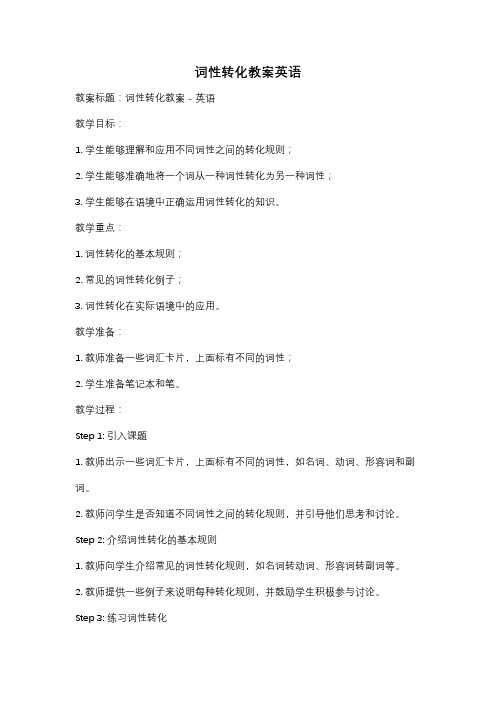
词性转化教案英语教案标题:词性转化教案 - 英语教学目标:1. 学生能够理解和应用不同词性之间的转化规则;2. 学生能够准确地将一个词从一种词性转化为另一种词性;3. 学生能够在语境中正确运用词性转化的知识。
教学重点:1. 词性转化的基本规则;2. 常见的词性转化例子;3. 词性转化在实际语境中的应用。
教学准备:1. 教师准备一些词汇卡片,上面标有不同的词性;2. 学生准备笔记本和笔。
教学过程:Step 1: 引入课题1. 教师出示一些词汇卡片,上面标有不同的词性,如名词、动词、形容词和副词。
2. 教师问学生是否知道不同词性之间的转化规则,并引导他们思考和讨论。
Step 2: 介绍词性转化的基本规则1. 教师向学生介绍常见的词性转化规则,如名词转动词、形容词转副词等。
2. 教师提供一些例子来说明每种转化规则,并鼓励学生积极参与讨论。
Step 3: 练习词性转化1. 教师将学生分成小组,每组分发一些练习题。
2. 学生根据给定的词汇,尝试将其转化为不同的词性,并写在纸上。
3. 学生互相交流并讨论各自的答案,教师在此过程中提供指导和反馈。
Step 4: 应用词性转化知识1. 教师给学生提供一些句子,要求他们根据语境将词汇转化为正确的词性。
2. 学生在小组内进行讨论,并写下他们的答案。
3. 学生将自己的答案与其他小组进行比较,并与教师一起讨论正确答案。
Step 5: 总结和评价1. 教师与学生一起总结课堂上学到的词性转化规则和知识点。
2. 学生回答教师提出的问题,评价自己在本课中的学习效果。
拓展活动:1. 学生可以自行查找一些英语文章或课文,找出其中的词性转化例子,并进行分析和讨论。
2. 学生可以编写一篇短文,要求其中包含一定数量的词性转化词汇。
教学反思:1. 教师应在课前准备充分,确保对词性转化的规则和例子有清晰的理解;2. 教师应鼓励学生积极参与讨论,提高他们对词性转化的理解和应用能力;3. 教师应根据学生的表现及时给予指导和反馈,帮助他们纠正错误。
词性转换试讲教案设计模板
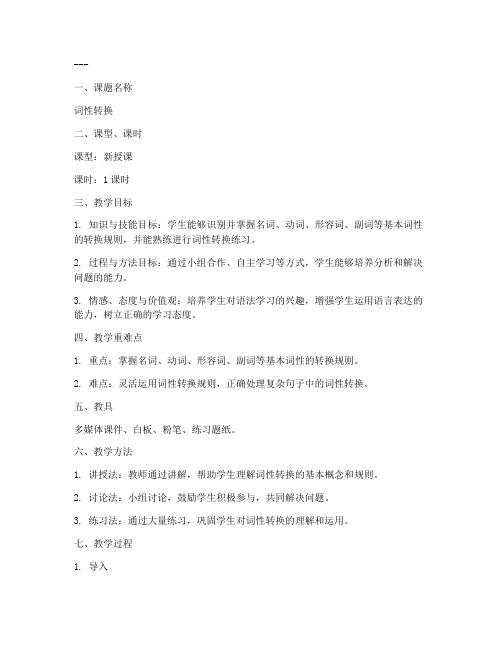
---一、课题名称词性转换二、课型、课时课型:新授课课时:1课时三、教学目标1. 知识与技能目标:学生能够识别并掌握名词、动词、形容词、副词等基本词性的转换规则,并能熟练进行词性转换练习。
2. 过程与方法目标:通过小组合作、自主学习等方式,学生能够培养分析和解决问题的能力。
3. 情感、态度与价值观:培养学生对语法学习的兴趣,增强学生运用语言表达的能力,树立正确的学习态度。
四、教学重难点1. 重点:掌握名词、动词、形容词、副词等基本词性的转换规则。
2. 难点:灵活运用词性转换规则,正确处理复杂句子中的词性转换。
五、教具多媒体课件、白板、粉笔、练习题纸。
六、教学方法1. 讲授法:教师通过讲解,帮助学生理解词性转换的基本概念和规则。
2. 讨论法:小组讨论,鼓励学生积极参与,共同解决问题。
3. 练习法:通过大量练习,巩固学生对词性转换的理解和运用。
七、教学过程1. 导入- 通过一个简单的英语故事,引入词性转换的概念,激发学生的学习兴趣。
- 提问:“在故事中,你发现了哪些词性的变化?”2. 新课讲授- 名词变动词:展示名词,引导学生思考如何将其变为动词,并举例说明。
- 动词变名词:展示动词,引导学生思考如何将其变为名词,并举例说明。
- 形容词变副词:展示形容词,引导学生思考如何将其变为副词,并举例说明。
- 副词变形容词:展示副词,引导学生思考如何将其变为形容词,并举例说明。
- 通过多媒体课件展示不同词性转换的例子,让学生观察并总结规律。
3. 小组讨论- 将学生分成小组,每个小组讨论一个复杂的句子,分析其中的词性转换,并尝试进行转换。
- 各小组汇报讨论结果,教师点评并纠正错误。
4. 练习巩固- 分发练习题,让学生独立完成。
- 教师巡视指导,解答学生疑问。
5. 总结- 回顾本节课所学内容,强调词性转换的重要性。
- 鼓励学生在日常生活中多注意词性转换的现象,提高语言表达能力。
6. 作业布置- 完成课后练习题,并复习本节课所学内容。
词性转化英语教案模板范文

教学目标:1. 让学生掌握英语中常见的词性转化形式及规律。
2. 提高学生在实际语境中运用词性转化能力。
3. 培养学生良好的英语语感和语用能力。
教学重点:1. 词性转化的形式及规律。
2. 词性转化在句子中的实际运用。
教学难点:1. 词性转化规律的理解与应用。
2. 在实际语境中运用词性转化。
教学过程:一、导入1. 教师通过PPT展示不同词性的例子,引导学生回顾英语中常见的词性及其功能。
2. 提问:同学们,你们知道英语中词性可以相互转化吗?请举例说明。
二、新课讲授1. 教师讲解英语中常见的词性转化形式,如名词转化为动词、形容词,动词转化为名词等。
2. 以PPT展示实例,引导学生分析词性转化的规律,如名词加后缀-er、-or等转化为动词,形容词加后缀-ly转化为副词等。
3. 教师结合实际语境,引导学生分析句子中词性转化的原因和效果。
三、课堂练习1. 教师出示一组词性转化的句子,让学生判断句子中词性的变化,并说明原因。
2. 教师出示一组未完成句子,让学生根据语境选择合适的词性填空。
四、巩固练习1. 教师组织学生进行小组讨论,分析一组含有词性转化的句子,讨论其在句子中的作用。
2. 学生自由发挥,用所学知识编写含有词性转化的句子。
五、总结与反思1. 教师引导学生总结本节课所学内容,强调词性转化的形式、规律以及在句子中的运用。
2. 学生分享自己的学习心得,提出疑问,教师进行解答。
教学评价:1. 通过课堂练习和小组讨论,评价学生对词性转化知识的掌握程度。
2. 通过学生编写的句子,评价学生在实际语境中运用词性转化能力。
3. 通过学生反思,了解学生对本节课教学内容的理解和掌握情况。
教学反思:1. 教师反思本节课的教学效果,分析学生在学习过程中遇到的困难,调整教学方法。
2. 教师关注学生的学习兴趣,激发学生对英语学习的热情。
人教版八年级上册英语第八单元词形转换
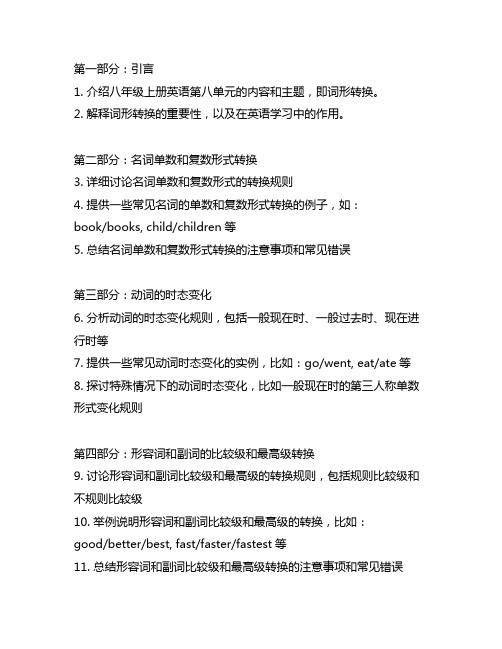
第一部分:引言1. 介绍八年级上册英语第八单元的内容和主题,即词形转换。
2. 解释词形转换的重要性,以及在英语学习中的作用。
第二部分:名词单数和复数形式转换3. 详细讨论名词单数和复数形式的转换规则4. 提供一些常见名词的单数和复数形式转换的例子,如:book/books, child/children等5. 总结名词单数和复数形式转换的注意事项和常见错误第三部分:动词的时态变化6. 分析动词的时态变化规则,包括一般现在时、一般过去时、现在进行时等7. 提供一些常见动词时态变化的实例,比如:go/went, eat/ate等8. 探讨特殊情况下的动词时态变化,比如一般现在时的第三人称单数形式变化规则第四部分:形容词和副词的比较级和最高级转换9. 讨论形容词和副词比较级和最高级的转换规则,包括规则比较级和不规则比较级10. 举例说明形容词和副词比较级和最高级的转换,比如:good/better/best, fast/faster/fastest等11. 总结形容词和副词比较级和最高级转换的注意事项和常见错误第五部分:介词和冠词的规范使用12. 分析介词和冠词的规范使用,包括常见的介词用法和冠词的特殊情况13. 举例说明介词和冠词的规范使用,比如:in/on/at, a/an/the等14. 探讨介词和冠词的常见误用和纠正方法第六部分:结尾15. 总结词形转换的重要性和实际应用价值16. 强调在学习过程中的重要性,鼓励学生在课后进行相关练习和巩固,以达到更好的学习效果。
通过以上的文章结构和内容安排,旨在帮助读者系统地了解和掌握八年级上册英语第八单元的词形转换知识,提高英语学习的有效性和学习成绩。
第二部分:名词单数和复数形式转换名词的单数和复数形式转换是英语学习中的基础知识之一。
在名词单数形式转换为复数形式时,通常需要根据不同的规则进行变化。
常见的规则包括在词尾加-s,-es,以及变化字母等。
大部分名词在词尾加上-s就可以表示复数形式,如book的复数形式是books,dog的复数形式是dogs。
动词名次形容词副词的转化教案
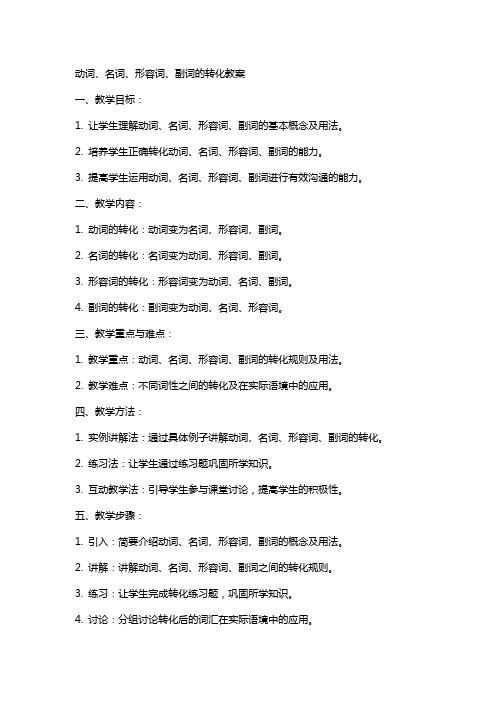
动词、名词、形容词、副词的转化教案一、教学目标:1. 让学生理解动词、名词、形容词、副词的基本概念及用法。
2. 培养学生正确转化动词、名词、形容词、副词的能力。
3. 提高学生运用动词、名词、形容词、副词进行有效沟通的能力。
二、教学内容:1. 动词的转化:动词变为名词、形容词、副词。
2. 名词的转化:名词变为动词、形容词、副词。
3. 形容词的转化:形容词变为动词、名词、副词。
4. 副词的转化:副词变为动词、名词、形容词。
三、教学重点与难点:1. 教学重点:动词、名词、形容词、副词的转化规则及用法。
2. 教学难点:不同词性之间的转化及在实际语境中的应用。
四、教学方法:1. 实例讲解法:通过具体例子讲解动词、名词、形容词、副词的转化。
2. 练习法:让学生通过练习题巩固所学知识。
3. 互动教学法:引导学生参与课堂讨论,提高学生的积极性。
五、教学步骤:1. 引入:简要介绍动词、名词、形容词、副词的概念及用法。
2. 讲解:讲解动词、名词、形容词、副词之间的转化规则。
3. 练习:让学生完成转化练习题,巩固所学知识。
4. 讨论:分组讨论转化后的词汇在实际语境中的应用。
5. 总结:对本节课的内容进行总结,强调重点知识点。
教案仅供参考,具体实施时可根据学生实际情况进行调整。
六、教学活动:1. 设计动词转化练习题,让学生进行课堂练习。
2. 设计名词、形容词、副词转化练习题,让学生进行课堂练习。
3. 组织学生进行小组讨论,分享各自完成的练习题,互相纠正错误。
七、教学评估:1. 课堂练习:检查学生在课堂练习中的表现,评估他们对动词、名词、形容词、副词转化的掌握程度。
2. 小组讨论:观察学生在小组讨论中的表现,评估他们的合作能力和沟通能力。
八、课后作业:1. 让学生完成课后练习题,巩固所学知识。
2. 鼓励学生在家中尝试运用动词、名词、形容词、副词的转化规则,与他人进行交流。
九、教学延伸:1. 开展课外活动,如写作、演讲、辩论等,让学生运用所学知识。
初中英语词性转换试讲教案

初中英语词性转换试讲教案教学目标:1. 学生能够理解英语中名词、动词、形容词和副词之间的转换关系。
2. 学生能够正确地将单词转换为相应的词性。
3. 学生能够在句子中灵活运用不同词性的单词。
教学内容:1. 名词转换为动词、形容词和副词。
2. 动词转换为名词、形容词和副词。
3. 形容词转换为名词和副词。
4. 副词转换为形容词和动词。
教学步骤:Step 1: 引入- 向学生介绍词性转换的概念,解释名词、动词、形容词和副词之间的转换关系。
- 举例说明词性转换在英语中的应用。
Step 2: 名词转换为动词、形容词和副词- 给出一些名词,如“achievement”、“advertisement”等,让学生尝试将它们转换为动词、形容词和副词。
- 引导学生通过词尾变化来确定不同的词性。
Step 3: 动词转换为名词、形容词和副词- 给出一些动词,如“achieve”、“advertise”等,让学生尝试将它们转换为名词、形容词和副词。
- 引导学生通过词尾变化和词义来确定不同的词性。
Step 4: 形容词转换为名词和副词- 给出一些形容词,如“big”、“small”等,让学生尝试将它们转换为名词和副词。
- 引导学生通过词尾变化和词义来确定不同的词性。
Step 5: 副词转换为形容词和动词- 给出一些副词,如“quickly”、“slowly”等,让学生尝试将它们转换为形容词和动词。
- 引导学生通过词尾变化和词义来确定不同的词性。
Step 6: 练习- 给学生提供一些练习题,让学生独立完成词性转换的练习。
- 引导学生通过词尾变化和词义来确定不同的词性。
Step 7: 总结- 回顾本节课的内容,强调词性转换的重要性和应用。
- 鼓励学生在日常英语学习中多练习和运用词性转换。
教学评估:1. 通过课堂练习和学生回答问题的表现来评估学生对词性转换的理解和应用能力。
2. 收集学生的练习答案,对学生的词性转换能力进行评估。
教学延伸:1. 引导学生进一步学习其他词性的转换,如介词、连词等。
动词名次形容词副词的转化教案
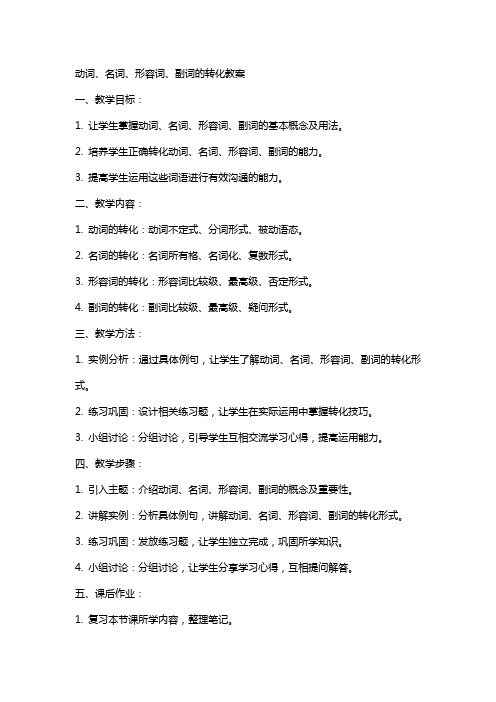
动词、名词、形容词、副词的转化教案一、教学目标:1. 让学生掌握动词、名词、形容词、副词的基本概念及用法。
2. 培养学生正确转化动词、名词、形容词、副词的能力。
3. 提高学生运用这些词语进行有效沟通的能力。
二、教学内容:1. 动词的转化:动词不定式、分词形式、被动语态。
2. 名词的转化:名词所有格、名词化、复数形式。
3. 形容词的转化:形容词比较级、最高级、否定形式。
4. 副词的转化:副词比较级、最高级、疑问形式。
三、教学方法:1. 实例分析:通过具体例句,让学生了解动词、名词、形容词、副词的转化形式。
2. 练习巩固:设计相关练习题,让学生在实际运用中掌握转化技巧。
3. 小组讨论:分组讨论,引导学生互相交流学习心得,提高运用能力。
四、教学步骤:1. 引入主题:介绍动词、名词、形容词、副词的概念及重要性。
2. 讲解实例:分析具体例句,讲解动词、名词、形容词、副词的转化形式。
3. 练习巩固:发放练习题,让学生独立完成,巩固所学知识。
4. 小组讨论:分组讨论,让学生分享学习心得,互相提问解答。
五、课后作业:1. 复习本节课所学内容,整理笔记。
2. 完成课后练习题,巩固所学知识。
3. 寻找生活中的实例,尝试运用动词、名词、形容词、副词的转化形式。
教学评价:1. 课后收集学生作业,检查学习效果。
2. 在下一节课开始时,进行课堂测试,评估学生掌握程度。
3. 关注学生在日常沟通中的运用情况,了解学习成果。
六、教学拓展:1. 动词、名词、形容词、副词的转化在实际应用中的重要性。
2. 举例说明动词、名词、形容词、副词转化在的不同语境中的运用。
3. 引导学生关注网络、报纸、杂志等媒体中的相关用法,提高语感。
七、教学案例分析:1. 分析现实生活中典型的动词、名词、形容词、副词转化案例。
2. 让学生结合案例,思考、讨论动词、名词、形容词、副词转化在实际沟通中的作用。
3. 引导学生学会运用动词、名词、形容词、副词转化,提高表达效果。
词性教案初中

词性教案初中课程目标:1. 让学生掌握英语中的主要词性,包括名词、动词、形容词、副词、介词、连词和冠词。
2. 培养学生正确运用各种词性进行表达的能力。
3. 提高学生对英语语法的基本认识,为深入学习英语打下基础。
教学内容:1. 词性的定义和分类2. 各类词性的特点和用法3. 词性转换的规则和方法教学步骤:Step 1: 引入词性的概念1. 向学生介绍词性的定义:词性是指单词在句子中所扮演的角色,它可以分为名词、动词、形容词、副词、介词、连词和冠词等。
2. 举例说明:例如,在句子 "The cat is sleeping" 中,"cat" 是名词,表示事物;"is" 是动词,表示动作;"sleeping" 是形容词,用来描述 "cat" 的状态。
Step 2: 讲解各类词性的特点和用法1. 名词:表示人、事物、地点或抽象概念。
例如:"boy"、"book"、"country"、"idea"。
2. 动词:表示动作、状态或变化。
例如:"eat"、"sleep"、"read"、"become"。
3. 形容词:用来描述名词的特征或性质。
例如:"big"、"small"、"happy"、"sad"。
4. 副词:用来修饰动词、形容词或其他副词,表示程度或方式。
例如:"quickly"、"slowly"、"happily"、"sadly"。
5. 介词:用来表示时间、地点、方向或关系。
例如:"in"、"on"、"at"、"by"。
- 1、下载文档前请自行甄别文档内容的完整性,平台不提供额外的编辑、内容补充、找答案等附加服务。
- 2、"仅部分预览"的文档,不可在线预览部分如存在完整性等问题,可反馈申请退款(可完整预览的文档不适用该条件!)。
- 3、如文档侵犯您的权益,请联系客服反馈,我们会尽快为您处理(人工客服工作时间:9:00-18:30)。
八年级上英语词性转换整理八年级上英语词性转换整理词性转换练习1. ill adj. illness n. worse 比较级ill: I am ill.illness: He didn’t go to school because of illness. .worse: He is even worse than yesterday.2. close adj. & v. enclose v . closer 比较级 closing n.close: Close the door, please. My school is close to my home.enclose: I enclose a photo of myself.closer: My house is much closer to our school than his.closing: You should write closing at the end of a letter. closing-time 停止营业时间3. British adj. Britain n.British: He works in a British company.Britain: He comes from Britain.4. greet v. greeting n.greet: She greeted me with a smile.greeting: Send my greeting to all your family.5. friend b. friendly adv. friendship n.friend : We are good friends.friendly: She is friendly to everyone.friendship: Friendship is important to us.6. foot n. feet n.foot: He is a five-foot-tall boy.feet: I am about five feet four inches tall.7. Europe n. European adj.Europe: I like to travel in Europe.European : France is a European country.8. post n.&v. postal adj. poster n. postman n.post: The post office is over there. Would you please post a letter for me? poster: There is a poster on the blackboard.postman: I want to be a postman.postal :I know my school’s postal code.9. arrive v. arrival n.arrive:She’s arrived in shanghai.arrival: The captain apologized for the late arrival of this flight.10. sign v. signature n.sign: Sign your name here, please.signature:I couldn’t read his signature.11 weight n. weigh v.weight:What’s your weight?weigh : I weigh 50kg.e v. useful adj. useless adj. used adj.use: Can I use your pen?useful: The tool is useful.useless: The new machine is useless.used: I used to walk to school.13. wait v. waiter n. waitress n.wait : I’m waiting for the bus to come.waiter: There are 6 waiters in the restaurant.waitress: The waitress is kind to the customers. .14.call v. & n. called adj.call : I’ll make a phone call to him at the weekend. I’ll call you later.called: I have a brother called Edwin.15.him himself his hehim: Please give this present to him.himself: He finished the homework by himself.his: To his joy, he passed the exam.he: I spoke to Ben before he left.16. good better bestgood: He is a good boy.better: I’m better at maths than he.best: Try your best, and you’ll win..17. true adj. truly adv. truth n.true: Is it true that Tom is leaving ?truly: We are truly thankful to you for your help.truth: Please tell me the truth.18.own v. & adj. owner n.own: He owns a car. He has a car of his own.owner: I am the owner of this house.19.favor n. favourite adj.favor: Can you do me a favor?favorite: Who is your favorite singer?20.old older oldest elder elderlyold: This house is quite old.older: This book is older than that one.oldest: This book is the oldest book in the library.elder: I have an elder brother.elderly: He is an elderly man.21.bore v. bored adj. boring adj.bore: These old jokes bore me.bored: I’m bored because there is nothing to do at home.boring: I don’t like the film because it is boring.22.care n. careful adj. carefully adv.careless adj. carelessly adv. carelessness n.care: I don’t care what you do .careful Be careful of the knife. It’s very sharp.carefully Please listen carefully.careless It was careless of you to go out without locking the door. carelessness Because of his carelessness, he lost his life.23. engineer n. engine n. engineering n.engineer: My father works as an electronic engineer.engine: He started the engine and drove the car away.engineering electrical engineering 电机工程学24. ambition n. ambitious adj.ambition : My ambition is to be an architect.ambitious I’m not ambitious and I’m satisfied with my life now.25. happy adj. happiness n. happily adv. unhappy adj. unhappily adv.happy: I’m happy because I have a good dayhappiness: I wish you happiness.unhappy : I’m unhappy because I have a bad dayunhappily: I go to school unhappilyhappily: I go to park happily26. discuss v. discussion n.discussion: Let’s have a discussiondiscuss: I will discuss the problem with my friend next week27. luck n. lucky adj. luckily adv. unlucky adj. unluckily adv..luck (n.) eg. Good luck!lucky (adj.) eg. He is lucky to win the first prize.luckily (adv.) eg. Luckily, I passed the exam.unlucky (adj.) eg. 13 is an unlucky number in western countries.unluckily (adv.) eg. Unluckily, I forgot to bring some money.28. busy adj. busily adv. Business n. businessman n. businesswoman n. busy (adj.) eg. He is busy doing his homework. He is busy with his homework.business (n.) eg. She stearted a business two years ago..eg. The manager will go on business next week.busily (adv.) eg. She is writing something busily.businessman (n.) eg. He is a businessman.businesswoman (n.) eg. She is a businesswoman.29. sell v. seller n. sale n. sales n. salesman n.be sold out v.sell The book sells well. 销量不错seller He is a book seller.sale The book is on sale.sales He is responsible for sales.30. account n. accountant n. count v. countless adj.account n.账户 How much money have I got left in my account? accountant n. He is an accountant.count v. The teacher counted the children as they got on the bus. countless adj. I’ve tried to telephone him countless times.31.manager n. manage v. management n.manager: My father is a managermanage : My father manages two companiesmanagement :Our class needs good management32.succeed v. success n. successful adj. successfully. adv.succeed I succeeded in passing the exam.successful He is a successful mansuccess Hard work is the key to success.successfully She finishes her work successfully33.responsible adj. responsibly adv. irresponsible adj. responsibility n. responsible adj. The school is responsible for the safety of the children.responsibly adv. Please behave responsibly while I am out.irresponsible adj. You can’t trust him. He is an irresponsible man. responsibility n. I refuse to take any responsibility if anything goes wrong. ually adv. usual adj. unusual adj.usually adv. My mother usually drives me to school .usual adj. It’s usual for her to work at weekends.He is late for school as usual. 和往常一样unusual adv. What an unusual hat he wears !35. noise n. noisy adj. noisily adv.noise n. Don’t make any noise. Your father is sleeping.noisy adj. We live on a very noisy road.noisily adv. The clock goes noisily .36.assist v. assist sb in/with sth assist sb.to do sth.assistant n. assist sb. in doing sth.assistance n. financial assistance 经济援助assistant: The manager has two assistantsassist: She shouted for help but nobody came to assist her37. tour n. v. tourism n. tourist n. a tour guide 一个导游tour: We wil go on a three-day tour of shanghaitourism: Tourism is very important to our economy.(经济)tourist: The tourists like taking photos38. fail v. failure n.fail v. He failed to pass the exam.failure n. His failure to pass the exam made me unhappy.39. two n. twice n . second n. secondly adv. secondary adj.two He has two brothers.twice I have been to Beijing twice.second I am the second student to get to school .secondly First, I think it is too expensive and secondly we don’t really need it. secondary He goes to a secondary school.40. turn v. n. turning n. return v.turn. He turned the page and started the next chapter.You can’t both play on the computer at the same time. You’ll have to take turns.轮流turning n. Take the third turning on the right. 在第三个路口向右拐。
